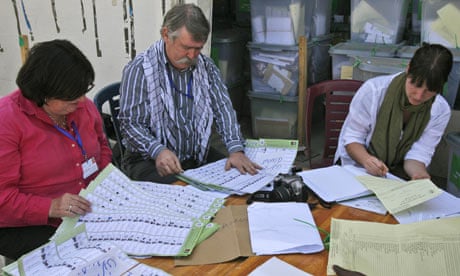Five US soldiers were among dozens killed in a wave of violence in Afghanistan as pressure grew on President Hamid Karzai last night to strike a power-sharing deal with his rival, Abdullah Abdullah. It came after the country's election commission failed to declare a winner in the hotly disputed presidential poll. The decision has coincided with a surge of violent unrest, with officials saying yesterday that 50 Afghan civilians, security force members and Taliban fighters were killed in different attacks across the country, including a bomb that left 14 Afghan travellers dead. The American soldiers died in two roadside bomb attacks.
The deepening crisis increases the stakes for Washington and London, where public opinion is hostile to an ever more bloody war in support of a flawed and corruption-prone political process.
More than three weeks have passed since Afghans voted for a new president, but the chaotic count has been marred by allegations of widespread irregularities including phantom polling stations and stuffed ballot boxes. Most appear to favour Karzai. Yesterday the election commission announced a sliver of fresh results that suggest Karzai is on course to win. With 93% of votes counted the incumbent has 54% support versus 28% for Abdullah, his former foreign minister.
But the UN-backed electoral complaints commission, which adjudicates on disputes, has disqualified votes from 83 polling stations and ordered a recount in parts of three provinces thought to be favourable to Karzai. Votes from 600 stations have been quarantined.
If Karzai's share of the vote dips below 50%, a run-off vote will be necessary. The UN stressed that the contest was not over. "There are no winners in this election yet," said spokesman Aleem Siddique.
But western officials privately admit that a run-off vote is well nigh impossible at this stage. The fraud investigations could take weeks and the bitter winter is approaching, making it impossible to hold a fresh poll until the spring. That places Afghanistan in a perilous political limbo as violence spreads across the country.
In the absence of an undisputed winner, western allies are likely to ratchet up pressure on Karzai and Abdullah to strike a deal for a coalition or national unity government in the coming weeks. But so far both candidates have maintained hardline positions.
Karzai has rebuffed American pressure over the vote, and in a punchy interview told Le Figaro he would never be an "American puppet". Abdullah has largely stayed his hand, hoping international pressure will force a compromise. If that fails he could mobilise street protests in Kabul or render northern Afghanistan, where his ethnic Tajik support base is concentrated, ungovernable by Kabul. Officials have warned that in such circumstances Karzai would not be allowed through the Salang Pass, the mountain tunnel that connects Kabul to the northern areas. "There's a risk the country would fracture, not in a noticeable way, but in terms of Karzai's ability to exercise power in the north," said the official.
The turmoil comes against a backdrop of weakening public resolve among western allies. The human cost of the British commitment was underscored by the death of Corporal John Harrison in an operation to rescue kidnapped journalist Stephen Farrell last week.
In the US, Democratic politicians are hesitant to commit the extra troops requested by their generals. On Friday the chairman of the Senate armed services committee, Carl Levin, warned the US had "lost the initiative" and called for a shift in strategy.
Russia's outspoken ambassador to Kabul has waded into the debate, warning Washington to avoid the mistakes made by Soviet forces in the 1980s. At the peak of the Soviet occupation in 1987 Moscow had 140,000 troops in Afghanistan. Two years later it was forced into a humiliating retreat.
Today violence in Afghanistan has reached its worst level in eight years despite a record deployment of more than 100,000 foreign troops. One western official, speaking on condition of anonymity, said that in the worst case scenario, events could spin dangerously out of control.
"A situation could arise where Karzai is left to rely on the NDS [intelligence service] and the power of patronage to break any opposition, while Abdullah and his friends use every tool to oust an illegitimate government.
"That leaves western troops with a problem: what do they do, and who is the enemy?"
